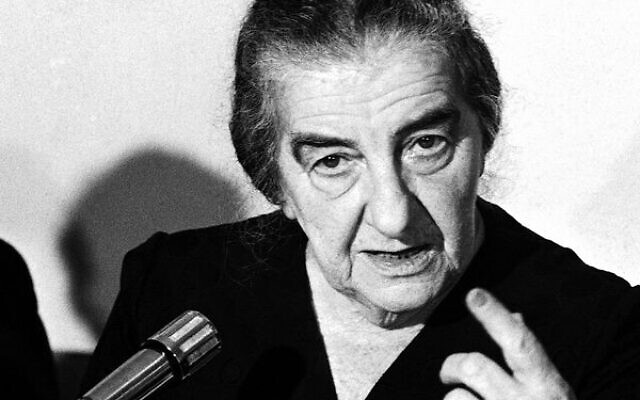Golda Meir considered Palestinian statehood
Declassified protocols indicate former PM mulled the idea.

(Times of Israel) – Former Israeli prime minister Golda Meir considered the possibility of the formation of a Palestinian state alongside Israel three years after the Six-Day War, protocols published by Haaretz show, shedding new light on the premier who famously said, “There’s no such thing as Palestinians.”
In June, the Israel State Archives declassified top secret transcriptions of a meeting Meir held in October 1970 with senior ministers, including defence minister Moshe Dayan and education minister Yigal Allon, in which the possibility of a Palestinian state was discussed.
“It will be necessary to leave the Arabs of Judea and Samaria an option to earn self-determination at a later stage, if and when it suits us,” Meir said at the start of the meeting. “In other words, there will be another country [alongside Israel].”
Meir did say she viewed such a possibility as drastic. She also noted that she did not care what the name of the country would be.
The protocol shows that Meir considered potential political arrangements for a Palestinian state: as a state that is member to a confederation with Israel, Jordan or both, or as a completely independent country. However, the prime minister seemed troubled by these scenarios, saying that such arrangements would be created in order to destroy Israel.
Interestingly, the meeting took place just weeks after “Black September”, the month-long conflict between the Palestinian Liberation Organisation and the Jordanian kingdom that saw the PLO banished to Lebanon and brought to one of its historical low points. Nevertheless, Meir said, “If [PLO chief Yasser Arafat] becomes prime minister of Jordan, we will negotiate with him. Arafat as the head of a terrorist organisation – no. But if he becomes head of a government that he’ll represent as a Palestinian, then fine.”
Meir, who throughout her career refused to recognise the Palestinians’ right to self-determination, also said at the meeting that she had become “open-minded on the issue, even though [my mind] closed right after the Six-Day War, but I’m ready to reopen my mind and listen if there’s a hint of a hint of a hint of hope of there being a small state in Judea and Samaria, and maybe Gaza”.
The protocol continues with a discussion of the details of a potential Palestinian state, with the prime minister completely rejecting the idea of Jerusalem serving as the capital of such a nation. Meir explained that the Israeli War of Independence allowed Israel to offer minimal concessions in case of negotiations with the Palestinians.
“Why is Jaffa less Palestinian than any other place? And that was in their land. Will we give it to them? I’m prepared to go pray and to thank God that they declared war against us in 1948,” she said. “How would we have lived with it? I don’t know, but in the end, it was not us that declared war.”
Like Meir, the other ministers were receptive, but highly cautious regarding the idea, with Allon saying that no “Balfour Declaration” should be made on the subject – a reference to the 1917 statement in which the British government announced its support for the founding of a “Jewish home” in Ottoman-ruled Mandatory Palestine.
“I don’t suggest encouraging a Palestinian state,” the former Palmach commander said. “Rather, in the long term, a peace contract that will keep options open.”
Notably, Allon also said that the existence of the Palestinian people was “not up to me and not up to Golda Meir. If they see themselves as Palestinians, then we can say 1000 times they’re not, but they will remain [Palestinians] regardless”.

comments